Microsemi unveiled PolarFire FPGA + RISC-V SoC about one year ago, but at the time, development was done on a $3,000 platform with SiFive U54 powered HiFive Unleashed board combined with an FPGA add-on board from Microsemi.
I’ve now been informed that Microchip has announced its Linux-capable PolarFire FPGA+RISC-V SoC would start shipping in Q3 2020 at the RISC-V summit and that a development kit will be sold for a few hundred dollars.
PolarFire SoC FPGA
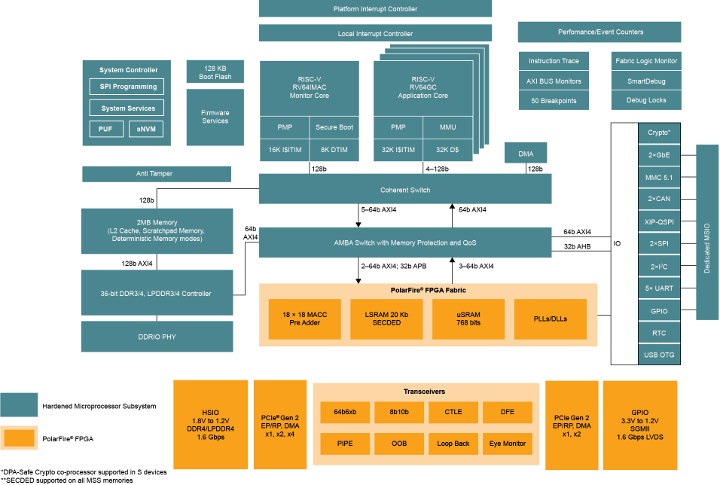
PolarFire SoC FPGA key features and specifications:
- Mid-Range FPGA optimized for Low Power
- High-speed serial connectivity with built-in multi-gigabit/multi-protocol transceivers from 250 Mbps to 12.7 Gbps
- Up to 461k logic elements consisting of a 4-input Look-Up Table (LUT) with a fracture-able D-type flip-flop
- Up to 31.6 Mb of RAM
- Power optimized transceivers
- Up to 1420 18 × 18 multiply-accumulate blocks with hardened
pre-adders - Integrated dual PCIe for up to ×4 Gen 2 Endpoint (EP) and Root Port
(RP) designs - High-Speed I/O (HSIO) supporting up to 1600 Mbps DDR4/LPDDR4, 1333 Mbps DDR3L, DDR3/LPDDR3 memories with integrated I/O gearing
- General Purpose I/O (GPIO) supporting 3.3V built-in CDR to support SGMII for serial gigabit Ethernet, and 1600 Mbps LVDS I/O speed with integrated I/O gearing logic
- Instant-on, non-volatile technology offers 50% lower power vs. equivalent SRAM FPGAs
- Up to 50% lower power
- Versatile, Low-Power Multi-Core RISC-V CPU Sub-System
- 64-bit multi-core CPU cluster
- Linux and real-time in a deterministic and coherent CPU cluster
- Integrated DDR3/4, LPDDR3/4 controller and PHY
- Defense grade secure boot
- Spectre and meltdown immune
- Physically unclonable function
- Physical memory protection
- SECDED on all memories
- Low static power
- Low-power CPU cluster
- Small form factors – 11 x 11mm, 16 x 16mm, 19 x 19mm
There are currently five SKUs planned for release: MPFS025T, MPFS095T, MPFS160T, MPFS250T, and MPFS5460T with 23k to 461k logic elements.
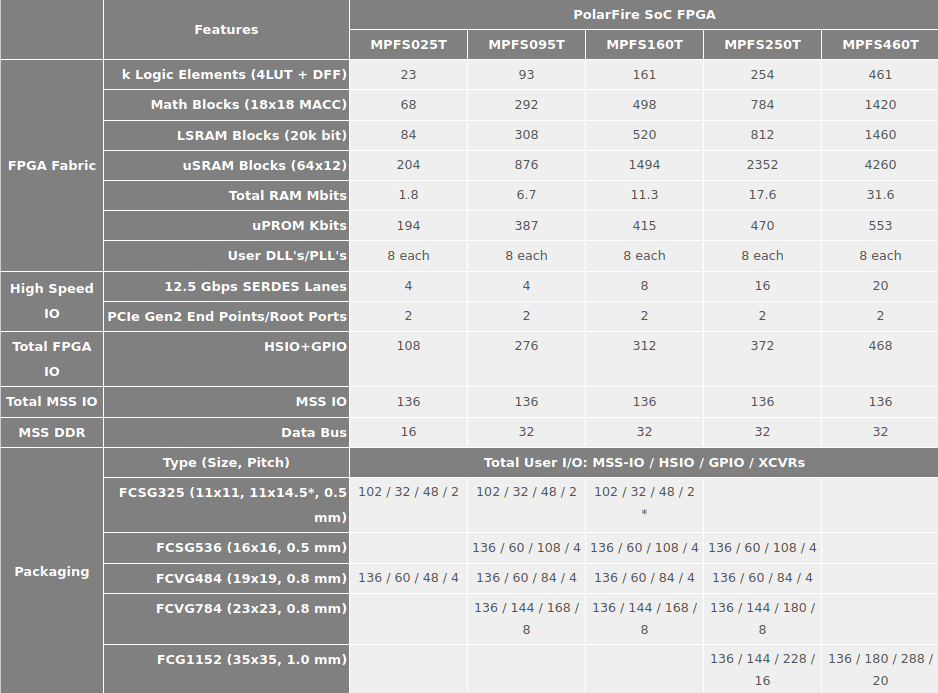
Key improvements over Arm-based FPGA SoCs
Low power

The chart above shows higher efficiency for MPFS095T ~100kLE SoC FPGA against their Cortex-A9/Cortex-A53 competitors likely Xilinx Zynq 7000 series/Zynq Ultrascale+ series. The PolarFire SoC FPGA can deliver much better performance per watt.
The same is true for the entry-level MPFS025T SoC FPGA with ~25kLE which delivers 5.5k CoreMarks at 1.05W while competing Arm-based SoC FPGAs are not able to run at such low power. The power consumption is also 45% lower power at max output.
The top of the range MPFS460T SoC FPGA works at a power consumption as low as 2.05 Watts, while the Arm equivalent requires at least a little over 3 Watts to operate. The power consumption is up to 65% lower power at 8k CoreMarks.
Security
The level of security is always a challenge to evaluate, and at least one of the selling points in that respect is the immunity to Spectre and Meltdown HW security flows. The company also provided a tablet showing security features against three unnamed competitors.
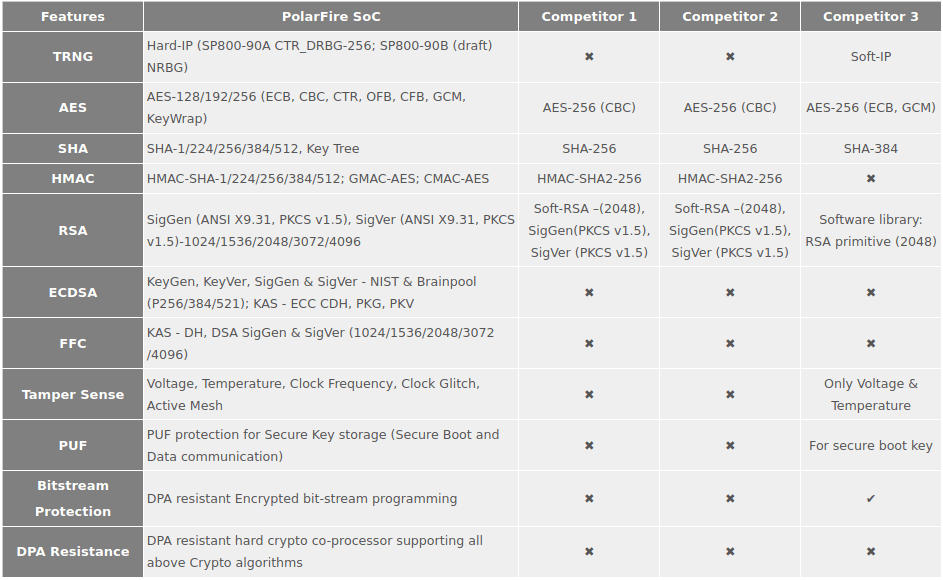
The tablet (obviously) looks good for PolarFire SoC since it was provided by Microsemi, but it’s likely the Arm platforms are also more mature in that respect, and they are time-tested.
A Deterministic, Real-time Linux capable SoC
Another advantage pointed out by Microsemi is the deterministic nature of the SoC which does not suffer from greatly varying interrupt execution time like on Arm.
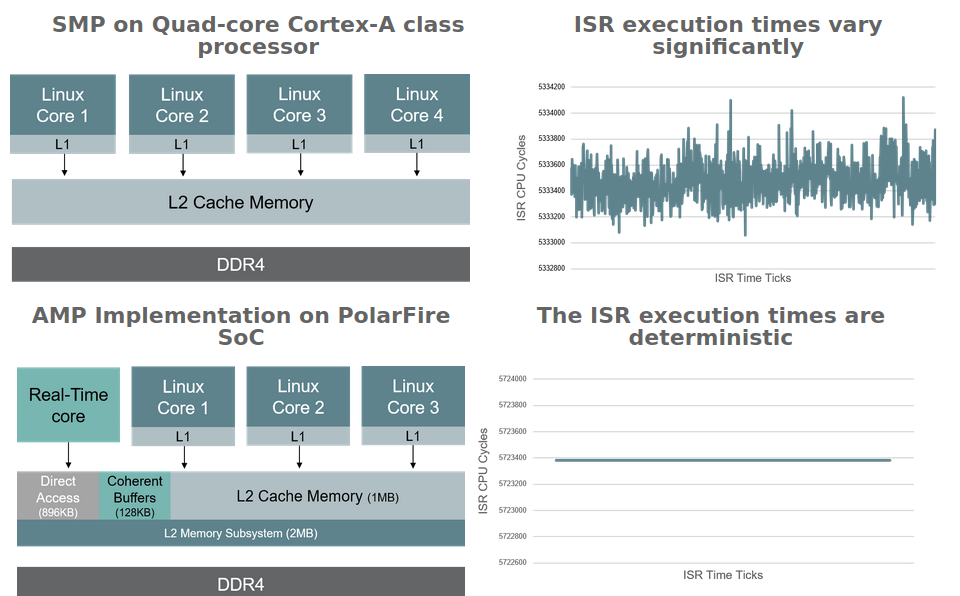
Microsemi SoC FPGA can support deterministic, real-time operations because they are a dedicated real-time core taking care of I/Os. So while Xilinx Zynq 7000 series Cortex-A9 + FPGA SoC will certainly have this issue, Xilinx Zynq Ultrascale+ FPGA SoC combines Cortex-A53 cores with Cortex-R5 real-time cores which, as I understand it, makes it deterministic just like PolarFire SoC FPGA.
PolarFire SoC Icicle Kit
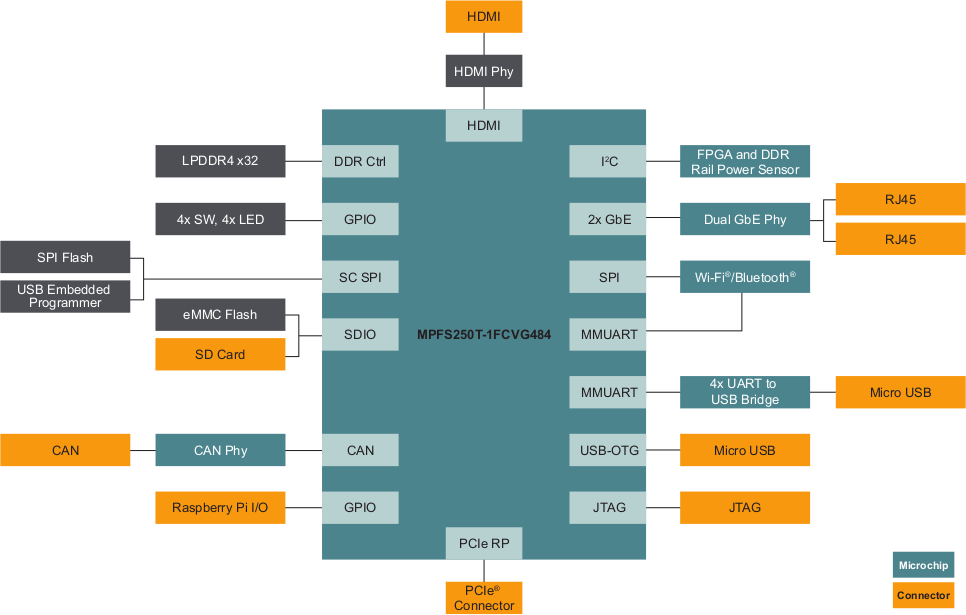
The company will also offer PolarFire SoC Icicle Kit (Part number MPFS250-KIT) with the following specifications:
- SoC FPGA – PolarFire SoC MPFS250T-1FCVG484 penta–core RISC-V CPU subsystem (1xRV64IMAC, 4xRV64GC) with 254k LE non-volatile fabric, 784 18 × 18 math blocks, secure boot, 4× 12.7 Gbps SERDES, FCVG484 package
(19 × 19 mm, 0.8 mm pitch) - System Memory – LPDDR4 x32
- Storage – QSPI Flash, eMMC Flash
- Video Output – HDMI 2.0
- Connectivity – 2x Gigabit Ethernet, Wi-Fi, and Bluetooth
- USB – micro USB 2.0 OTG port, micro USB port for debugging
- Expansion Ports
- 40-pin Raspberry Pi compatible header with GPIO, I2C, SPI, UART,
- PCIe connector, USB 2.0, UART, SPI, I2C, CAN, HDMI 2.0
- Sensor – Power sensor
- Debugging – JTAG + micro USB (UART)
- Misc – 4x LEDs, 4x buttons
The company will provide various tools including Libero SoC Design Suite with several IP cores for the FPGA, SoftConsole Eclipse-based development environment for the development of bare-metal and RTOS based embedded
firmware, as well as a Linux SDK, and support for multiple real-time operating systems including FreeRTOS, VxWorks, Zephyr, and others. We do not have any photos of the kit just yet, as it’s still under development.
More details about PolarFire SoC FPGA may be found on the product page, and drivers and examples on Github.
Thanks to Carl Perry for the tip!

Jean-Luc started CNX Software in 2010 as a part-time endeavor, before quitting his job as a software engineering manager, and starting to write daily news, and reviews full time later in 2011.
Support CNX Software! Donate via cryptocurrencies, become a Patron on Patreon, or purchase goods on Amazon or Aliexpress





Wonder if the board will have additional header to be accessible via the FPGA.
I think the schematics have been posted on the product page already.
This looks like a strong contender to applications where the Zynq is popular. I think it’ll live or die based on how badly they mess up the tooling for it.